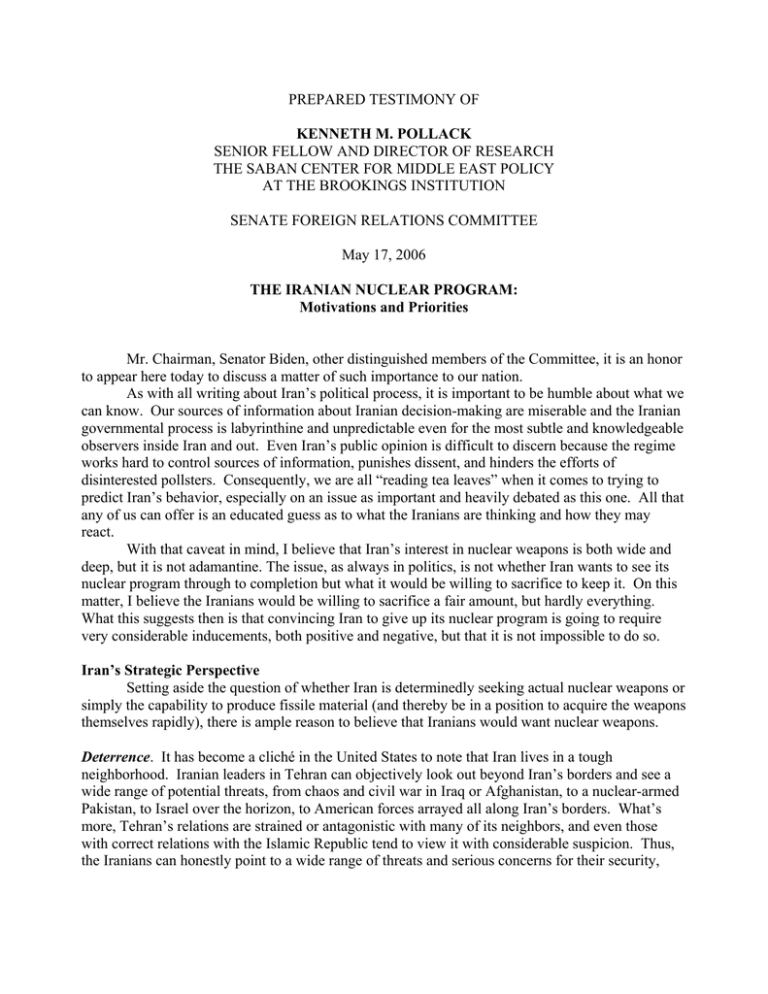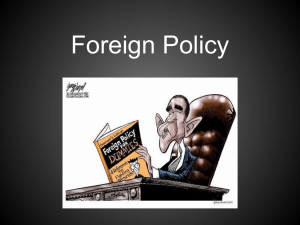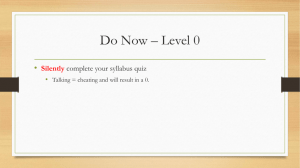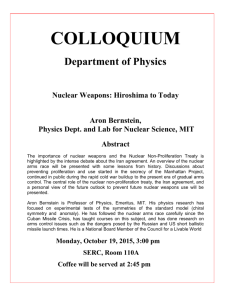PREPARED TESTIMONY OF SENIOR FELLOW AND DIRECTOR OF RESEARCH
advertisement

PREPARED TESTIMONY OF KENNETH M. POLLACK SENIOR FELLOW AND DIRECTOR OF RESEARCH THE SABAN CENTER FOR MIDDLE EAST POLICY AT THE BROOKINGS INSTITUTION SENATE FOREIGN RELATIONS COMMITTEE May 17, 2006 THE IRANIAN NUCLEAR PROGRAM: Motivations and Priorities Mr. Chairman, Senator Biden, other distinguished members of the Committee, it is an honor to appear here today to discuss a matter of such importance to our nation. As with all writing about Iran’s political process, it is important to be humble about what we can know. Our sources of information about Iranian decision-making are miserable and the Iranian governmental process is labyrinthine and unpredictable even for the most subtle and knowledgeable observers inside Iran and out. Even Iran’s public opinion is difficult to discern because the regime works hard to control sources of information, punishes dissent, and hinders the efforts of disinterested pollsters. Consequently, we are all “reading tea leaves” when it comes to trying to predict Iran’s behavior, especially on an issue as important and heavily debated as this one. All that any of us can offer is an educated guess as to what the Iranians are thinking and how they may react. With that caveat in mind, I believe that Iran’s interest in nuclear weapons is both wide and deep, but it is not adamantine. The issue, as always in politics, is not whether Iran wants to see its nuclear program through to completion but what it would be willing to sacrifice to keep it. On this matter, I believe the Iranians would be willing to sacrifice a fair amount, but hardly everything. What this suggests then is that convincing Iran to give up its nuclear program is going to require very considerable inducements, both positive and negative, but that it is not impossible to do so. Iran’s Strategic Perspective Setting aside the question of whether Iran is determinedly seeking actual nuclear weapons or simply the capability to produce fissile material (and thereby be in a position to acquire the weapons themselves rapidly), there is ample reason to believe that Iranians would want nuclear weapons. Deterrence. It has become a cliché in the United States to note that Iran lives in a tough neighborhood. Iranian leaders in Tehran can objectively look out beyond Iran’s borders and see a wide range of potential threats, from chaos and civil war in Iraq or Afghanistan, to a nuclear-armed Pakistan, to Israel over the horizon, to American forces arrayed all along Iran’s borders. What’s more, Tehran’s relations are strained or antagonistic with many of its neighbors, and even those with correct relations with the Islamic Republic tend to view it with considerable suspicion. Thus, the Iranians can honestly point to a wide range of threats and serious concerns for their security, although the fact that their own actions have been responsible for much of the animosity they face is probably lost on most of them. In other words, possession of nuclear weapons makes sense from an Iranian perspective for purely defensive reasons. While nuclear weapons cannot solve all of Iran’s security problems, they can solve some, and in so doing might make dealing with the rest much easier. At the most extreme, Iran is unlikely to be able to deter a determined American military operation without a nuclear arsenal. This lesson has no doubt been driven home to the Iranians by the divergent experiences of Iraq and North Korea, the two other members of President Bush’s “Axis of Evil.” North Korea is believed to possess nuclear weapons and so the United States has not attacked it and is being forced to engage with Pyongyang. On the other hand, Saddam Husayn’s Iraq did not possess nuclear weapons—but was believed to be trying to acquire them—and so the United States was willing to invade and overturn the Ba’thist regime. It is hard to imagine that the leadership in Tehran did not see this as a very simple set of reinforcing conclusions: if you have nuclear weapons, the United States will not dare use force against you, but if you don’t, you are vulnerable. Prestige. We should never forget that the Iranians see themselves as the lineal descendants of a 2,500-year old civilization that bequeathed to the world its first superpower (the Persian Empire of Cyrus the Great, Darius, and Xerxes), and a long string of great powers from the Parthians to the Sassanids to the Safavids. Only very recently, as measured by the full tale of human history, has Persian power been supplanted in the region by European and eventually American power. A great many Iranians believe that their country’s history, experience, and natural resources mandate for it a role as one of the world’s great powers and the dominant force in southwest Asia and the Persian Gulf. To the legacy of Persia’s imperial greatness can be added the pride of the Islamic Revolution, which since 1978 has reinforced to many Iranians the sense that their nation has been marked by destiny to play a leading (perhaps “the” leading) role in the region and the Islamic world. Although many Iranians have soured on the revolution, others continue to see it as vital to Iran’s mission in the world and many more still see it as another sign that Iran should be the intellectual, diplomatic, and military hegemon of the region. Persian pride appears to be another motivation in Iran’s pursuit of nuclear enrichment capability, if not actual nuclear weapons. Acquiring nuclear weapons would give Iran a status that only a very few other nations possess. It would immediately catapult Iran into the “big leagues” of world politics. It would likely force other states to pay more attention to Iran’s aspirations and wishes. Here the recent model that seems to stand out in the minds of many Iranians is India, whose development of nuclear weapons—and their acceptance by the international community—has been a critical element of New Delhi’s acceptance as one of the great powers of the world, whose views should be considered on any matter of importance. Since this is the position to which many Iranians seem to aspire, matching India in the nuclear realm also appears to be a self-evident necessity for Iran. Export of the Revolution. For at least some Iranians, typically referred to as the “radical hardliners,” Ayatollah Khomeini’s dream of exporting Iran’s Islamic Revolution to the rest of the Muslim world (and possibly even beyond) is yet another motive. Throughout the 1980s and, to a lesser extent during the early 1990s, Iran attempted to realize this dream by attempting to subvert reactionary Middle Eastern governments and assist would-be revolutionaries in those same countries. Iranian efforts in Iraq, Saudi Arabia, Kuwait, Bahrain and even Lebanon were all 2 motivated in part or in whole by this goal. But Iran’s efforts in these countries triggered the animosity of the United States and in at least one case (Iraq during the Iran-Iraq War) prompted limited but direct American military intervention against Iran. In Lebanon, Iranian actions were part of what inspired American intervention there, and in Saudi Arabia, Iranian activities sparked other aggressive American responses as well as prompting debate in Washington over whether to mount retaliatory military actions against the Islamic Republic. For still other Iranians, another motivation to acquire nuclear weapons appears to be the related goal of waging war against the United States. This is an offensive version of the deterrence argument above that is also closely related to export of the revolution. Proponents of this motivation continue to see the world as Khomeini described it—as a battle between the forces of good, represented by Iran, and the forces of evil, represented by the United States. In this worldview, Iran will not just face endless attack by the United States but it will also face constant opposition to its efforts to export the revolution from the United States. Therefore, Iran must have the power to drive out American influence from the region and prevent the United States from keeping Iran from achieving its destiny. For Iranians holding either or both of these more offensive rationales, acquisition of nuclear weapons would also appear to be vital because it would be the only sure way to limit or preclude an American military response for Iranian asymmetric warfare, terrorism and subversion against the U.S. and its conservative allies in the region. Motivations vs. Priorities The Iranians clearly have a range of powerful motivations, strategic, ideological and psychological, for desiring an arsenal of nuclear weapons—or at least the capability to manufacture such weapons in short order. Nevertheless, it would be a mistake to confuse motivations with a universal and indomitable determination to do so. The history of the past 60 years demonstrates that other states with equal or greater strategic need, ideological justification, and/or psychological desire for nuclear weapons ultimately chose either not to pursue them at all or to give up their pursuit midstream: • In the 1960s it was considered a foregone conclusion that Egypt would develop a nuclear weapon as its strategic and psychological incentives were even more compelling than Iran’s are today. Egypt was locked in a conflict with a nuclear-armed Israel which resulted in four mostly-disastrous wars (for Egypt) in 25 years, and Cairo aspired to be the “leader of the Arab world.” Yet Egypt shut down its nuclear weapons program entirely of its own volition because the Egyptian leadership concluded that it had higher priorities which the pursuit of nuclear weapons were undermining. • Leaders in Italy, Australia, Sweden, Japan and South Korea considered developing nuclear weapons at various points, and the Italians and Australians actually made some considerable progress toward that goal. However, all of them decided that nuclear weapons would be counterproductive to other, higher priorities, and that they could find ways to deal with their security problems (including even South Korea) through other means. • Belarus, Ukraine and Kazakhstan went even further in the early 1990s, voluntarily surrendering the nuclear arsenals that they had inherited from the Soviet Union. Although many Western academic strategists believed that they were insane to do so, all three 3 recognized that the security benefits from possessing nuclear weapons were outweighed by the diplomatic and economic benefits of giving them up—and strong economies and good relations with the rest of the world were of far greater importance to them. • Finally, there is the example of Libya, long one of the Middle East’s worst rogue states, which agreed to give up its nuclear program in December 2003 after ten years of UN sanctions convinced Muammar Qadhafi that his pursuit of the bomb was not worth the devastation of Libya’s economy and international relationships. What these examples demonstrate is that it is entirely possible for the international community to dissuade states from trying to acquire nuclear weapons and even persuade them to give them up, even when those states have compelling strategic rationales for possessing the weapons. In every case, the key has been to create a powerful set of positive incentives and negative disincentives geared to the priorities of the state in question. Iran’s political leadership is divided over its nuclear program in important ways. While the available evidence suggests that most Iranian leaders would like at least a nuclear weapons capability (if not the weapons themselves), it also indicates that they differ widely in the priority they ascribe to this goal. For instance, in an interview in 2002, then minister of defense, Ali Shamkhani, warned that the “existence of nuclear weapons will turn us into a threat to others that could be exploited in a dangerous way to harm our relations with the countries of the region.” More important still, former President ‘Ali Akbar Hashemi Rafsanjani has warned that “If there [are] domestic and foreign conflicts, foreign capital will not flow into the country. In fact, such conflicts will lead to the flight of capital from this country.” Statements like these demonstrate that important Iranian leaders do not regard possession of nuclear weapons either as an unvarnished blessing or Iran’s highest priority. The same appears to hold true for the Iranian populace, as best we can discern it. When Iranians took to the polls in the spring of 2005 to elect a new president, they did not vote for Mr. Ahmedinejad because he was determined to acquire nuclear weapons. Instead, they voted for him because he promised to reform Iran’s economy and curb the rampant corruption that is the principal blight on the economy. Anecdotal evidence has repeatedly confirmed that for the Iranian people, “it’s the economy, stupid.” Of course, many average Iranians continue to voice their support for Iran’s nuclear program and even for acquisition for nuclear weapons, but stated in a vacuum (i.e., without regard for potential trade-offs) such sentiments are meaningless. As a friend of mine, a Swedish diplomat, put it to me, “If you were to ask Swedes whether Sweden should have a nuclear weapon most of them would probably say ‘yes’ too until you told them that it would come at the cost of isolation or even sanctions.” What’s more, the regime appears to be well aware of this. Supreme Leader ‘Ali Khamene’i and his allies have tried hard to steer clear of policy paths that would cause Iran’s European and Japanese trading partners to impose economic sanctions on Tehran, even being willing to agree to suspend Iran’s nuclear program in 2003 to avoid such a fate. It is noteworthy that while President Ahmedinejad and his hard-line colleagues in Iran’s foreign ministry regularly reject foreign overtures to deal with Iran’s nuclear program, Khamene’i’s people have just as frequently contradicted the hardliners by being announcing a willingness to negotiate. Thus it was Ahmedinejad’s foreign ministry that rejected the 2005 Russian proposal to allow Iran to enrich uranium at Russian facilities, but days later National Security Adviser (and Khamene’i protégé) ‘Ali Larijani accepted the Russian offer to start a dialogue on this proposal, almost certainly in an effort 4 to drag out negotiations, postpone UN Security Council action, and possibly harden Russia’s support for Tehran’s position. It is also important to note that the regime itself has scrupulously maintained that the nuclear program is about securing Iran’s energy needs (so that it can export more oil and gas) and developing a high-tech industry. While there are a number of logical and evidentiary problems with these claims, what is critical is that they are designed to portray Iran’s nuclear program as necessary to Iran’s economy, not its security. Indeed, Tehran is so paranoid about this that it temporarily evicted CNN’s bureau from Iran when a CNN interpreter mistranslated “nuclear power” as “nuclear weapons” in a speech of Ahmedinejad’s. This too makes clear that the regime shares the belief that if the Iranian people were ever forced to choose between the nuclear program and economic health, they would choose the latter. Squaring the Circle This discussion suggests that convincing Iran to give up its nuclear program is going to be tough. The Iranians are not going to do so willingly. But it also tells me that doing so should not be impossible, because there are Iranians—both the bulk of the people and important members of the regime—for whom nuclear weapons are desirable, perhaps even important, but neither essential nor even their first priority. Another comparison is useful to illustrate this point. North Korea’s calculus regarding nuclear weapons was clearly different from Iran’s. For Pyongyang, its nuclear weapons program was its highest priority and it was willing to tolerate hardships that few other countries (including even Iran) would be willing to. Ultimately, North Korea accepted the devastation of its economy, the impoverishment of its citizenry, and having 3 million of its people starve to death to hold onto its nuclear weapons program. If the same could be said about Iran then it probably would be impossible to convince Iran to give up its nuclear program; however, there is no Iranian or Iran expert who believes that this is the case. There is absolutely no evidence that Tehran would be willing to tolerate the extremes of sacrifice that North Korea did. Instead, the evidence suggests exactly the opposite, that Iran would be more like Libya: difficult, but hardly impossible to convince. The key then is for the United States and its allies to compel the Iranians to choose between their nuclear program and their highest priority—their economic well-being. The way of doing so is now well-explicated, including in my own work. Briefly, it would involve a multilateral sanctions regime that would gradually shut down Western (ideally the OECD, but initially perhaps just the G-7) investment in Iran, particularly its gas and oil sectors, in response to continued Iranian recalcitrance. Even with oil prices above $60 per barrel, Iran is desperate for Western investment capital because corruption is sucking the oil revenues right out of the system and thus having little impact on the overall economy. Despite the claims of some that Russia and China could make up for any loss capital from Europe and Japan, the fact is that their economies are still roughly a decade away from being in a position to do so. Simultaneously, as we did with the Libyans, in return for Iran agreeing to abandon its nuclear program and do so in verifiable fashion, the West (or the UN Security Council) would offer Tehran a package of incentives to include admission to the WTO and integration into the global economy, a lifting of U.S. economic sanctions (assuming that, like Libya, Iran renounced terrorism as well) and a universal settlement of all outstanding claims, investment guarantees to make investing in Iran more attractive for Western companies, provision of properly safeguarded light water reactors, terms for giving Tehran access to enrichment technology (without the feedstock materials, the equipment, or the spent fuel), security guarantees, and ideally a new 5 security architecture in the Persian Gulf similar to the Organization of Security and Cooperation in Europe that would allow Iran to address its legitimate security concerns through a peaceful process of dialogue and, eventually, arms control. Presenting such a package would make clear to the Iranian people and their leadership that their country really did have just two choices. They could retain their nuclear program (and their support for terrorism) and they would become an international outcast and have their economy slowly crippled by sanctions. Or they could give up these two things and enjoy all of the benefits of the international community that they ever dreamed of. Two additional caveats suggested by the discussion of Iranian motives and priorities are also in order here. First, the package would have to make very clear that all Iran has to give up is its pursuit of nuclear weapons—not nuclear energy or nuclear technology—to get all of the benefits promised. Any ambiguity here would allow Iran’s hardliners to continue to proffer the canard that Iran’s nuclear program is about its economy, thus engaging Iran’s highest priority and making it less likely that the Iranian people would favor it. Second, both the carrots and the sticks employed by the international community are going to have to be very big. Iran has major strategic, ideological, and psychological equities attached to its nuclear program and it will not budge easily. Small carrots, like those offered by President Bush on March 10, 2005 (admission to the WTO and sale of spare parts for Boeing passenger aircraft) or simply deals for nuclear reactors and technology, are probably not going to be adequate. The Iranian people will have to believe that there is a huge pot of gold at the end of the rainbow, especially if they are going to be able to help Iran’s more pragmatic leaders defeat Tehran’s hardliners in what is likely to be a knock-down, drag-out internal political battle. Similarly, no one should be under the misimpression that Iran will accept such a deal without the threat of very serious economic sanctions. Indeed, it seems likely that the international community, or merely the West acting outside the UN in multilateral fashion, will have to impose strong sanctions on Iran and keep them in place for some time before Tehran accedes. As noted above, it took ten years for Libya to come to terms, although the Libya sanctions were relatively light as far as sanctions go. Moreover, throughout the 1990s the European countries threatened Iran with sanctions for its bad behavior but never, ever followed through on their threats no matter how outrageous Iran’s behavior. Consequently, it appears that Iran does not believe that the Europeans will be willing to impose such sanctions, let alone maintain them for very long. This is the root of Tehran’s current strategy of brinksmanship: the Iranians seem certain that, in the end, the Europeans will balk and when that happens, the crisis will be over and they can go back to both pursuing nuclear weapons and enjoying trade and investment from Europe. Thus there strategy is to give on nothing and force the Europeans either to make good on their threats or, as Tehran seems to believe, admit that they are bluffing. For this reason, the Iranians are probably going to have see the Europeans actually impose meaningful sanctions and be willing to hold them in place for some time before Tehran actually believes the Europeans mean business. None of this should be terribly heartening, but neither should it be cause us to lose heart. We always knew that convincing states like Iran that have a range of important rationales for pursuing a nuclear capability to give it up is difficult. But few things in the worlds of politics and diplomacy are impossible, and there is good reason to believe that Iran can be dissuaded from its current course if the United States and its allies in Europe and Asia can forge a common position and make clear to Iran that pursuit of a nuclear weapon will cost it what most Iranians value the most. 6







